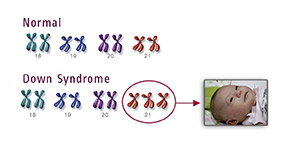Non-invasive tests are also called screening tests and they are of two types
- First-trimester screening test
- Second-trimester screening tests.
Screening tests cannot definitely diagnose Down’s syndrome, but as it non-invasive it is a useful screening method if the baby shows high risk or the test is a positive then diagnostic test which is the invasive test needs to be done.
First-trimester screening test - Blood test and Nuchal scan
Blood test - Measures two proteins produced by placenta called HCG and PAPP-A at 9 to 14 weeks
Nuchal scan - Nuchal translucency is the collection of fluid beneath the fetal skin in the region of the fetal neck which is seen as blank space beneath the skin. This is usually seen in all fetus in early pregnancy. This space is measured during11 to 14 weeks and should be less than 2.5 mm. If the measurements are more than 2.5 mm, it could indicate downs syndrome.
Second-trimester screening is the Triple or quadruple test - This measures the levels of AFP, HCG, conjugated estriol and inhibin-A levels at 15 to 18 weeks.
Invasive tests are of two types
Chorionic villus sampling is done in the first trimester and Amniocentesis is done in the second trimester. Invasive tests have a small risk of complications and sometimes leading to miscarriage.
During CVS a small tissue from the placenta called the chorion is taken and tested for any genetic abnormalities. The cells of the chorionic villi contain the same genetic material as the cells of the embryo and can thus be used to diagnose any genetic abnormalities. Done between the 9th and the 11th week of pregnancy. Amniocentesis is usually done between 15 to 18 weeks of pregnancy
[quix id='8' name='About our Pregnancy Blogs and Videos']

